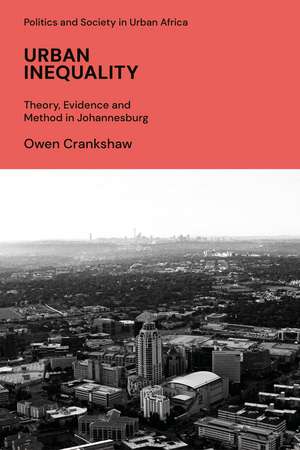Urban Inequality: Theory, Evidence and Method in Johannesburg: Politics and Society in Urban Africa
Autor Owen Crankshawen Limba Engleză Paperback – 23 aug 2023
| Toate formatele și edițiile | Preț | Express |
|---|---|---|
| Paperback (1) | 191.22 lei 6-8 săpt. | |
| Bloomsbury Publishing – 23 aug 2023 | 191.22 lei 6-8 săpt. | |
| Hardback (1) | 539.64 lei 6-8 săpt. | +114.86 lei 6-10 zile |
| Bloomsbury Publishing – 23 feb 2022 | 539.64 lei 6-8 săpt. | +114.86 lei 6-10 zile |
Preț: 191.22 lei
Preț vechi: 249.30 lei
-23% Nou
Puncte Express: 287
Preț estimativ în valută:
36.59€ • 37.75$ • 30.53£
36.59€ • 37.75$ • 30.53£
Carte tipărită la comandă
Livrare economică 26 martie-09 aprilie
Preluare comenzi: 021 569.72.76
Specificații
ISBN-13: 9781786998958
ISBN-10: 1786998955
Pagini: 232
Dimensiuni: 156 x 234 x 25 mm
Greutate: 0.33 kg
Editura: Bloomsbury Publishing
Colecția Zed Books
Seria Politics and Society in Urban Africa
Locul publicării:London, United Kingdom
ISBN-10: 1786998955
Pagini: 232
Dimensiuni: 156 x 234 x 25 mm
Greutate: 0.33 kg
Editura: Bloomsbury Publishing
Colecția Zed Books
Seria Politics and Society in Urban Africa
Locul publicării:London, United Kingdom
Caracteristici
Useful for lecturers teaching on urban inequality, as it addresses the arguments and provides discussion on evidence and method
Notă biografică
Owen Crankshaw is Full Professor of Sociology at the University of Cape Town, where he is an expert in the design and statistical analysis of surveys and population censuses. He is the author of Race, Class and the Changing Division of Labour Under Apartheid (1997) and co-author of Uniting a Divided City: Governance and social exclusion in Johannesburg (2002). He has contributed to many other books and scholarly journals in the field of Urban and African Studies.
Cuprins
AcknowledgementsList of FiguresList of TablesIntroduction: 1.Theories of Urban InequalityPart One: De-Industrialisation and the Labour Market2.The Changing Occupational Structure: Social Polarisation or Professionalisation?3.Professionalisation, Unemployment and Racial InequalityPart Two: From a Fordist to a Post-Fordist Spatial Order4.Johannesburg's Fordist Spatial Order5.The Edge City of Sandton6.From Racial Ghetto to Excluded Ghetto: Soweto, Eldorado Park and Lenasia7.Racial Residential Desegregation in White NeighbourhoodsConclusion8.Urban InequalityReferences
Recenzii
This detailed study of urban inequality in Johannesburg provides a rigorous examination of the links between de-industrialisation, occupational change, residential segregation and the housing market. It highlights the way in which race and the legacy of the South African apartheid state intersect with changes in the structure of the labour market over a 40 year period from 1970-2011 to change the structure of urban inequality. It is an invaluable source which links to wider international debates about urban social polarisation, professionalization and the post-Fordist city. A 'must read' for all students of African cities.




